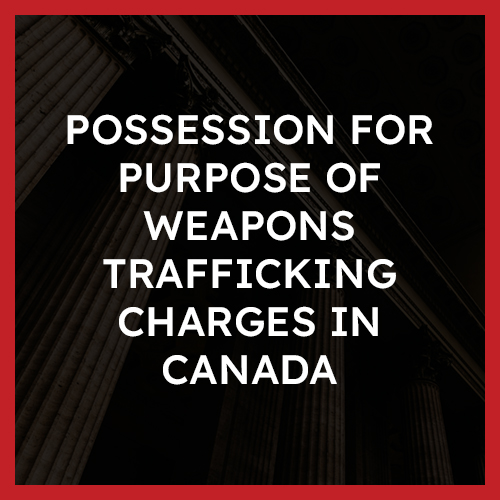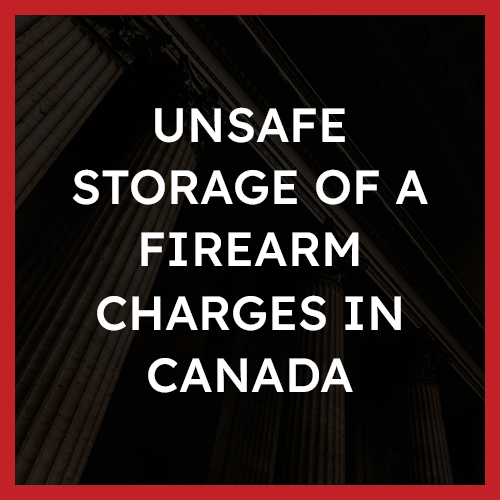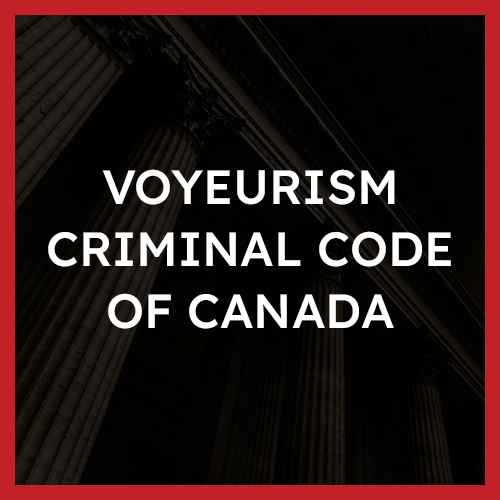Possession for Purpose of Weapons Trafficking Laws in Canada Explained

A possession for purpose of weapons trafficking charge occurs when an individual possesses a prohibited, restricted, or non-restricted firearm, weapon, device or ammunition with the intention of transferring it or offering it for transfer to another, while knowing that they are not legally authorized to complete the transfer under legislation made by Parliament.
Possession for purpose of weapons trafficking is an indictable offence. This means that punishments tend to be higher and more serious, as the crimes themselves are more serious than those falling under summary or hybrid offences. Under s. 536(2), there is a defence election; the accused can choose to have their matter heard in provincial court, or superior court with either a judge-alone or with judge-and-jury.
Examples
Some examples of a a possession for purpose of weapons trafficking charge may include the following:
- The accused transferred a prohibited firearm to another, without having the requisite authority to do so;
- The accused sold ammunition to another without the requisite authority to do so;
- The accused lent their prohibited device to another without the requisite authority to do so; and
- The accused offered to transfer their firearm to another at a later point, knowing that they do not have the authority to do so.
Defences
The defences available to a possession for purpose of weapons trafficking charge are entirely dependent on the facts of your case.
However, some defences to a possession for purpose of weapons trafficking charge may include:
- The accused had the authority to transfer the firearm or other device;
- The accused was under duress when they transferred or intended to transfer the weapon;
- The accused did not transfer or offer to transfer their firearm or other device to another without authority; and
- The accused was wrongfully identified as the person who committed the offence.
Punishment
A Possession for purpose of weapons trafficking charge is a hybrid offence, which entails a maximum punishment as follows:
- Imprisonment for a term not exceeding 14 years.
Punishments for possession for purpose of weapons trafficking range from the maximum term of 14 years in jail to a minimum of 3 years in jail. If the accused is a first time offender, they are guilty of an indictable offence and liable to a minimum term of imprisonment of 3 years. If they are a re-offender, they are also guilty of an indictable offence and liable to a term of 5 years in jail. In both cases, the maximum term of imprisonment is 14 years.
A possession for purpose of weapons trafficking charge can also entail severe consequences for current and future employment opportunities and immigration status.
Overview of the Offence
According to s. 100(2) of the Criminal Code:
Possession for purpose of weapons trafficking
100 (1) Every person commits an offence who possesses a prohibited firearm, a restricted firearm, a non-restricted firearm, a prohibited weapon, a restricted weapon, a prohibited device, any ammunition or any prohibited ammunition for the purpose of (a) transferring it, whether or not for consideration, or
(b) offering to transfer it,
knowing that the person is not authorized to transfer it under the Firearms Act or any other Act of Parliament or any regulations made under any Act of Parliament.
Punishment — firearm
100 (2) Every person who commits an offence under subsection (1) when the object in question is a prohibited firearm, a restricted firearm, a non-restricted firearm, a prohibited device, any ammunition or any prohibited ammunition is guilty of an indictable offence and liable to imprisonment for a term not exceeding 14 years and to a minimum punishment of imprisonment for a term of
(a) in the case of a first offence, three years; and
(b) in the case of a second or subsequent offence, five years.
The Guilty Act (Actus Reus)
The actus reus for a possession for purpose of weapons trafficking charge under s. 100(2) is established by proof, beyond a reasonable doubt, of the following:
Possession for purpose of weapons trafficking 100(2)
- The accused possessed a firearm, device or ammunition; and
- The accused transferred it, for or not for consideration.
OR
- The accused possessed a firearm, device or ammunition; and
- The accused offered to transfer it.
The actus reus refers to the act or the omission itself that constitutes the physical elements of a crime. Thus, the physical aspect of a possession for purpose of weapons trafficking charge
would be constituted by any physical act that constitutes this charge. Thus, one example would be that the accused transferred a firearm in their possession to another.
The Guilty Mind (Mens Rea)
The mens rea for a possession for purpose of weapons trafficking charge under s. 100(2) includes proving, beyond a reasonable doubt, that:
- The accused knowingly possessed a firearm, device or ammunition; and
- The accused was aware he was transferring the item for the purpose of trafficking.
OR
- The accused knowingly possessed a firearm, device or ammunition; and
- The accused knowingly considered transferring the item for the purpose of trafficking.
Mens rea is defined as the knowledge or intention of committing the crime. Thus, knowing that one has in their possession a firearm or other listed item, without any lawful excuse, and fully aware of all of these facts, consists of the mens rea of the charge.
Defences
How to Beat a Possession for Purpose of Weapons Trafficking Charge
Every case is different. The availability and strength of any defence depend entirely on the specific facts of your case. The strength of any available defence rests on the evidence against you and the precise details of the allegations. However, the following are some common defences that may be used when fighting a possession for purpose of weapons trafficking defence:
Factual innocence
Factual innocence is a possible, strong, defence against a false statements respecting firearms charge. If you can prove, using the facts and the evidence of your case, that you were not engaged in an act under s. 100(2), or that the evidence cannot place you as the perpetrator of a possession for purpose of weapons trafficking act, then you may be able to defend yourself by stating that you were factually innocent. Therefore, if you can show that the facts and the evidence do not support that you had possession of a firearm or other listed device for the purpose of weapons trafficking, that you were not unlawfully in possession of the firearm or other listed item or that you had possession but not for the purpose of trafficking, then you may be able to prove that you were factually innocent.
Duress
Another possible defence to a false statements respecting firearms charge is duress. Duress is proven when the five criteria listed below are met.
- That there was a threat of present/future death or physical harm,
- That the accused reasonably believed the threat would be carried out,
- That the accused had no safe way to avoid the harm,
- That it is because of the threat that the accused did what they did, and
- That the harm that the accused caused was not disproportionate to the harm that was threatened against the accused.
All five of the elements of duress must be met for the defence of duress to apply.
Necessity
To be able to raise a defence of necessity, you must show that your actions were reasonably involuntary and unavoidable. Necessity is raise where there are emergency situations or self-preservation or preservation of others required. The key to raising this defence is to prove that your actions were truly involuntary. You, as the accused, have the burden to establish that this defence is likely. To do this, you must prove all three elements of the defence:
- The accused must have been in imminent danger;
- The accused must have had no reasonable alternative to the actions the accused took; and
- The harm inflicted by the accused has to be proportional to the harm the accused avoided.
Identity
A defence based on the identity of the perpetrator may be a defence to a false statements respecting firearms charge. In order for this defence to be raised successfully in court, you would have to prove that you did not commit this act. This is a defence that states that the accused was wrongfully convicted. Evidence that can be submitted to create a solid identification defence is eyewitness identification, DNA evidence, media and fingerprints.
Any applicable Charter defences
The Charter sets out your rights and freedoms before and after your arrest. If the police fail to abide by these rights deliberately or inadvertently, it could aid in your defence. If any of your Charter rights have been violated before or after your arrest, you may be able to have some or all of the evidence that the Crown is relying on to secure a conviction excluded under s. 24(2) of the Charter.
Punishments
The Criminal Code provides for a possible maximum term of imprisonment of no more than 14 years for those convicted of a possession for purpose of weapons trafficking charge.
The mandatory minimum punishment differs depending on whether this is a first offence or a subsequent offence. For a first offence, the minimum punishment is a term of imprisonment of three years, while for a second offence, the minimum punishment is a term of imprisonment of 5 years. In both cases, the maximum remains 14 years in jail.
Counsel may also be able to lower the jail sentence through discussions with the Crown prosecutors. However, due to their nature, firearms offences, such as this one, have longer mandatory minimum sentences that may be harder to overcome.
Beyond any immediate jail and/or probation sentence you receive, there is also a discretionary DNA Order.
This is authorized as a secondary offence listed under s. 487.04 (c), (d) or (e), and the DNA order can be authorized regardless of if the Crown proceeds summarily or by indictment.
Aggravating Factors
The punishment for this offence also varies depending on aggravating factors that the accused may have. Aggravating factors may increase the prison sentence and make the judge less favourable to lowering the sentence. These include prior convictions, criminal record, abuse of power, vulnerability of the victim, and more. Therefore, for example, if you have a prior criminal record, or were charged against a victim, your chances of getting lesser sentence are lower. If you have been charged with a s. 100(2) offence multiple times, this is also an aggravating factor.
Frequently Asked Questions
Can you go to jail for Possession for purpose of weapons trafficking?
Yes, you can go to jail for possession for purpose of weapons trafficking. The minimum penalty includes 3 years in prison for a first time offence, which means that even if this is your first s. 100(2) offence, you will probably go to jail.
What is the maximum penalty for Possession for purpose of weapons trafficking?
The maximum penalty for possession for purpose of weapons trafficking is no more than 14 years in jail.
Is Possession for purpose of weapons trafficking an indictable offence?
Possession for purpose of weapons trafficking is an indictable offence. This means that the offender faces greater punishments as compared to summary or hybrid offences. Indictable offences also tend to be more complicated in court and generally have heavier consequences on the offender.
Published Decisions
Border services charge Eckville and Rocky Mountain House men with weapons trafficking, 2023
Police intercepted a suspicious package at the home of an Eckville resident, containing, upon further inspection, several handgun kits. A few more kits of the same type were intercepted over the next few months. The police investigation led to the conclusion that Mckervey, an Eckville resident, Sonnenberg, a Rocky Mountain House resident, and Herndon, a Calgary resident, were all charged with multiple weapons trafficking charges, including multiple s. 100(1) charges.
You can read the full decision here.
Abbotsford man sentenced for home invasion and weapons trafficking, 2023
An Abbotsford resident was sentenced to three more years in jail after a home invasion. He appeared in provincial court with multiple charges, including three counts of possession for the purpose of weapons trafficking, though these were mostly stayed. The focus was on the home invasion that had taken place, as most of the previous charges were earlier charges and not relevant to the case at hand.
You can read the full decision here.
National probe leads to 58 charges against 11 people in Ontario: OPP, 2023
This ongoing national probe began in Montreal, and has spread over to the rest of Canada. After learning that there was a business selling firearm parts, the police began an investigation resulting, in Ontario alone, in 11 individuals being charged with 58 offences. The OPP notes show that 3D printed firearms, partially manufactured firearms, magazines, bulletproof vests, ammunition and more were seized. Of the individuals arrested, one was charged with a s. 100(1) offence. The rest were charged with various other weapons trafficking offences.
You can read the full decision here.
Contact Us
If you have been charged with a criminal offence, visit our location pages to contact our team.
About The Author
Ask A Question
We endeavor to respond to questions within 24 hours. If your matter is urgent, please call our office or submit a request for a free consultation.







